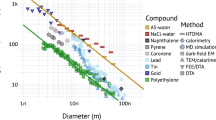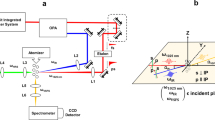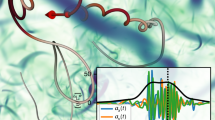Abstract
THE velocity of thermophoresis v of small aerosol particles of radius R, much smaller than the free path λ of the surrounding gas molecules, has been calculated by us1 in two ways: (1) as a limiting case of thermodiffusion; (2) by finding the momentum imparted to the particles by impact of molecules the velocity distribution of which is not disturbed by its presence, using the method of Chapman et al.2. The formula obtained for the case of diffusional molecular scattering:  where T is the Kelvin temperature, η and ρ the viscosity and density of the gas, reveals that v is independent of the thermal conductivity of the particles, in contrast to the case where R ≫ λ.
where T is the Kelvin temperature, η and ρ the viscosity and density of the gas, reveals that v is independent of the thermal conductivity of the particles, in contrast to the case where R ≫ λ.
This is a preview of subscription content, access via your institution
Access options
Subscribe to this journal
Receive 51 print issues and online access
$199.00 per year
only $3.90 per issue
Buy this article
- Purchase on Springer Link
- Instant access to full article PDF
Prices may be subject to local taxes which are calculated during checkout
Similar content being viewed by others
References
Bakanov, S. P., and Derjaguin, B. V., Koll. zhurn., 21, 377 (1959).
Chapman, S., and Kowling, T., The Mathematical Theory of Non-uniform Gases (Cambridge, 1952).
Derjaguin, B. V., and Bakanov, S. P., Doklady Akad. Nauk S.S.S.R., 144, 585 (1962).
Knudsen, Ann. d. Physik, 33, 1435 (1910).
Author information
Authors and Affiliations
Rights and permissions
About this article
Cite this article
DERJAGUIN, B., BAKANOV, S. Thermophoresis of Aerosol Particles. Nature 196, 669–670 (1962). https://doi.org/10.1038/196669a0
Issue Date:
DOI: https://doi.org/10.1038/196669a0
Comments
By submitting a comment you agree to abide by our Terms and Community Guidelines. If you find something abusive or that does not comply with our terms or guidelines please flag it as inappropriate.



